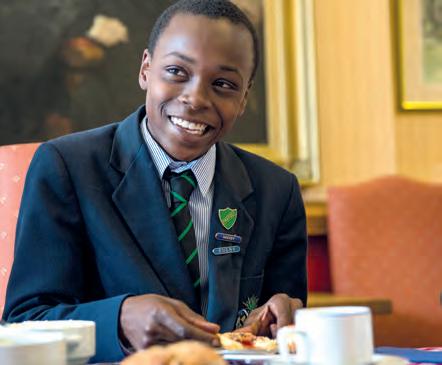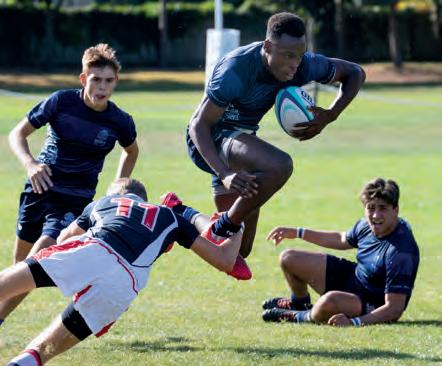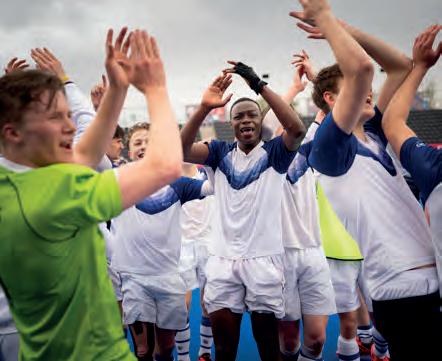
5 minute read
Feature: Black Lives Matter
#BLM
The outgoing School Captain and now OR of 2020 – Paul Brown – has been an exemplary leader of his peers since starting in The Close seven years ago. He has excelled academically (with a place secured at Durham University studying Engineering), represented the School at first-team level in key sports, spoken eloquently at many School events and simply epitomises our young cohort. As a complete aside, Paul also happens to be black and a former Foundation pupil. Why mention this? Because,
Advertisement
he wanted us to. It sets the context for the poignant speech he gave to pupils about one of the key issues of 2020 – the Black Lives Matter campaign – which we wanted to share.
The recent murder of George Floyd, and the protests that have ensued as a result of this atrocity, made me sit back and analyse what life has been like for me, a black kid, growing up and being educated in Surrey. I would like to share this with you as it’s often really easy for us – as British people – to focus on America and neglect the fact that sadly racism still exists here too.
Living in a predominantly Caucasian neighbourhood meant that I was one of the few black people in my area, in my school, and in every activity I did growing up. And even though, for the majority of my life, the people I’ve encountered have treated me with respect from a young age, it was apparent that just because of my skin colour, people had already made preconceived judgments about my character. For as long as I can remember, it has been common for me to get asked questions like: ‘Why don’t you sound like a black person?’; ‘Why are you such a coconut?’; and, even, ‘Why do you act so white?’
At times, I managed to see some sort of humour in the naivety of these comments, other times I was made to feel like I was betraying my own cultural identity. Fortunately, my family had already instilled in me a strong racial identity. One that encouraged me to pursue everything I wanted, irrespective of other people’s opinions – but I know that’s not the case for every black person. In hindsight, I regret that I let people speak to me that way and it angers me now that I allowed comments from people who didn’t understand my culture to make me feel disappointed in myself.
The fact that I was asked these questions when I was as young as seven or eight years old shows the pervasiveness of racism in our country. I was often pressured by some of my peers to act a certain way, look a certain way, and even to talk a certain way, all of which were too overwhelming for a kid who just wanted to do what he enjoyed. In some instances, these comments led to me giving up activities and sometimes even changing my behaviours, just because I’d been fed the lie that people that looked like me weren’t supposed to do certain things or act in a certain way.
It made me question whether I, as a black person, could have interests and passions that didn’t conform to the societal norm of my black predecessors. And that’s the danger of institutional racism, it’s subtle. It builds itself around stereotypes and, before you know it, you’ve been attributed certain characteristics just because of the colour of your skin. The whole reason for discriminatory behaviour (be that racist, xenophobic, chauvinistic,



or such like) is to keep minorities oppressed by not allowing them the freedom of expression and education. It prevents minorities from becoming valuable and valued individuals in all sectors of society; sadly this is very much the case with racism.
In my opinion, this ignorance around racism is not solely the fault of the individual but is due, in part, to the misinformation caused by the media. We’re consistently fed images of black people only succeeding in certain careers (sport, music, etc), so it almost becomes understandable that people are surprised when a black person doesn’t follow the trend and becomes the head of British Vogue, Louis Vuitton, John Lewis or, even, President of the US. I’m not saying these events should be downplayed, not at all, they deserve to be celebrated. I’m just looking forward to a point in time when it isn’t a big deal to be a black CEO or a black political leader, but rather when a person can be recognised for his/her values and achievements first, regardless of ethnicity. But how do we overcome this?
Everyone has a part to play, but especially my generation. For me and my fellow ethnic minorities one key way to address systematic racism is to stop being swayed by the opinions of uneducated and/or naive individuals and pursue whatever we feel passionate about. We need to stop being afraid because we’re entering uncharted territory – be that where we live, go to school or work – and, instead, be excited that we can be pioneers to change preconceptions. We should go for whatever we want; we should always be proud of the colour of our skin, as it is our heritage but it should never define who or what we can become. There is no blueprint for what a black person, or any person for that matter, should be.
We need to recognise that one of the ways we can eradicate racism is by having open and honest conversations between all races so there is mutual understanding. Stereotyping is dangerous in all forms – biased or unbiased; it governs how we perceive people’s characters and, when applied to ethnic minorities, it is allowing racism to win. We need to get to a point where we don’t have to stress that black lives matter and change society to recognise that all lives matter equally. I know, that along with those from my generation, we are looking forward to being part of that change. ■










